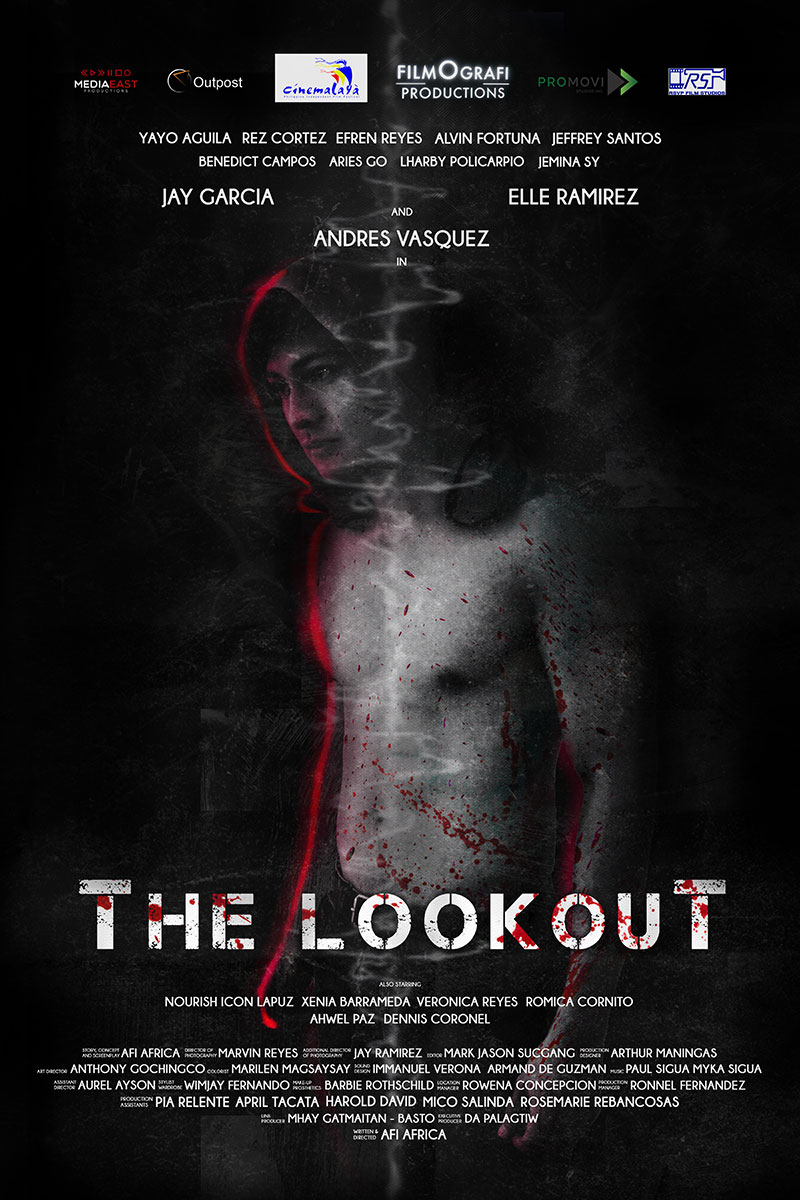It’s August once again. For cinephiles, it’s the season to splurge on movies. It’s movie buffet time in Cinemalaya and Pista ng Pelikulang Pilipino, which both fall during August annually.
In every film fest, there are films that emerge as crowd favorites, one who wins the people’s hearts and then there’s that one that majority of the audience hates. This year, the spotlight is on Afi Africa’s The Lookout, which is tagged as the weakest film of Cinemalaya 14 based on some film reviewers and critics.
Let’s inspect the good, the bad, and the ugly about The Lookout.
Simply put, The Lookout is about Lester Quiambao (Andres Vasquez), a gay for-hire killer who seeks revenge on his childhood abusers. We will use the Film Genre theory as the framework for this report. The Film Genre Theory is defined in FilmTheory.org as a theme, concept or category of a movie that makes it more likeable, compelling, and unforgettably successful over the years. [1] The Merriam-Webster, dictionary gives meaning to the word ‘genre’ as “a category of artistic, musical, or literary composition characterized by a particular style, form, or content”. [2]
The movie falls under the Action film genre. It uses the following as components:
- A hero seeking revenge on his abusers
- Action scenes and chase sequences
THE GOOD
The premise is actually promising because it offers something new in the action genre. Our protagonist is gay, and he doesn’t try to hide it. As audience, we know this right from the start. Moreover, there’s a gay romance involving our protagonist and his sidekick, Travis (Jay Garcia). That being said, this could have been a groundbreaking feat knowing that the action film genre is oozing with machismo. Given the characters, there could have been a great opportunity to redefine the genre.
When it comes to acting, Yayo Aguila, as Lester’s mother, is committed to the material. It’s evident in all her scenes. Whether she’s a battered wife trying to deal with her abusive partner or a desperate mother who wants the best for her children.
There are very good ideas incorporated in the film. For one, it showcases a character who grew up experiencing violence during his childhood. Lester (also George) is a complex character who deals with his terrible past by inflicting viciousness in the people around him. He was abused by his stepfather, he was sold by his mother to a gang (under the notion that he’d have a better life with them). Hence, the film implies that violence never stops; it’s a cycle.
THE BAD
The film is ambitious. It strives to be many things all at once: it’s about revenge; about extra-judicial killings and domestic violence; about a gay romance. Instead of a seamless flow, the filmmaker, Afi Africa doesn’t tie the scenes in a more cohesive way. For example, there’s this scene involving Lester and Travis having a confrontation, then some scenes thereafter, they begin to talk about their relationship, as if no clash happened prior.
The hammy acting from the other cast members also doesn’t work. Example, Elle Ramirez throwing tantrums inside the NBI office after their failed operation, thus making the culprits escape; Efren Reyes doing a monologue by voicing out his evil plans.
Endless poverty porn. We’ve seen children sold to gangs as commodities for human trafficking. We’ve also witnessed young people being involved in an underground sex trade (but we don’t know their reasons because the movie doesn’t explain it.) Yet instead of shedding light on their plight, we see what has been already said and told a lot of times in Philippine cinema.
THE UGLY
The graphic and gratuitous sex. The sex scenes are graphic and some do not contribute to the benefit of the narrative. For example, Lester hires three people to enact a threesome in his tub, practically a live show in his own house. There’s also a lengthy anal sex scene involving Yayo Aguila and her lover, while the latter is banging her head on the wall. Or the rape scene of Rez Cortez involving two guys, while he’s tied up. They could have been edited out and the story can still stand on its own.
The illogical and explicit script. Lester is depicted as someone rich, based on the opening scene where he was welcomed in the Kingdom, a prestigious membership club where he buys his lover Travis from among the many hunks who were seen topless near the swimming pool. So that would have meant he’s rich. But in the succeeding scenes, there’s no explanation how he ends up living in a bare, small apartment adjacent to the LRT. It’s inconsistent. The film implies that Lester is rich but at the same time, there are some scenes that do nothing but say he’s actually otherwise.
Also, words like “book-ingan” or “kangkangan” are used. This was even blurted out, “Sa tingin mo ba okay lang sa akin na chupain mo ako? Lalake ako, babae pa rin ang gusto ko”, says Travis to Lester. A reason why Ricky Lee has been regarded as one of the greatest Filipino scriptwriters is that he makes an otherwise dull story into a compelling script. Thus, if we are to look closely, there’s an art to good scriptwriting. The script of The Lookout may have been too straight up honest and honest, but it is also tactless to a fault. Not to forget the characters with illogical or questionable motivations. They’re close to the caricatures we see in most Pinoy TV soap operas.
To sum it all up, The Lookout is an example of a movie that’s so bad, it’s good to take a look at it in order to learn from it. Although it’s ambitious and promising, it fails to deliver. It’s illogical and messy; a hodgepodge of ideas that doesn’t effectively deliver the message it tries to get across. InqPOP!/Florence Rosini
DISCLAIMER: All views and opinions expressed in this post are solely those of the contributor/s and do not represent those of InqPOP! and INQUIRER.net. All InqPOP! Creator Community submissions appear “as is,” without any editorial intervention. The InqPOP! staff assumes no liability for any error in the content of this material. Got something you want to share to the world? Get a chance to publish your awesome creations and share it to the world through our InqPOP! Creator Community program. Send us your stories, videos, photos, fan fic, and even fan art at [email protected]



